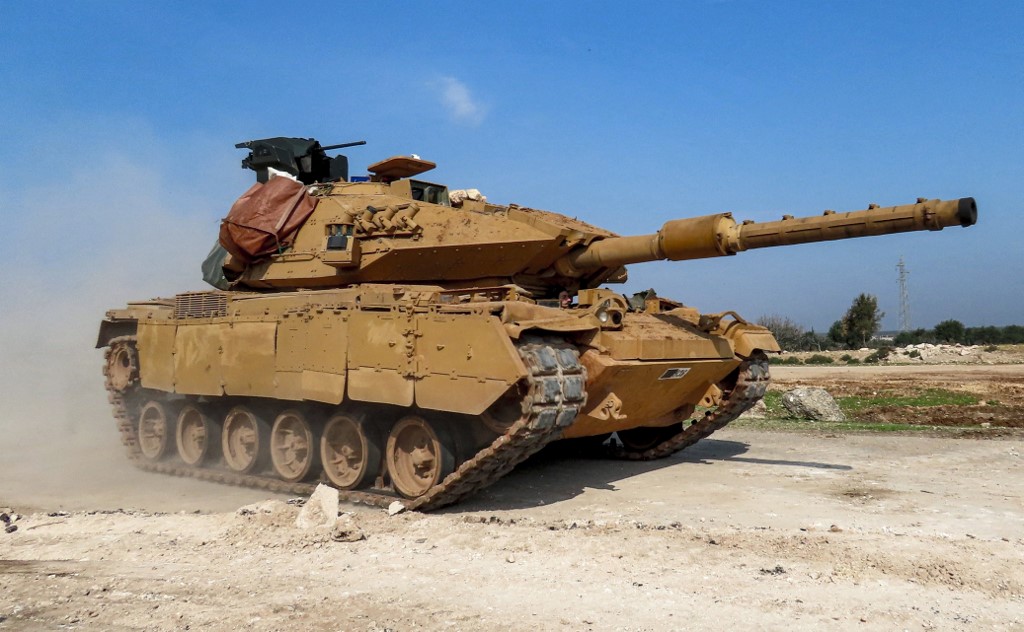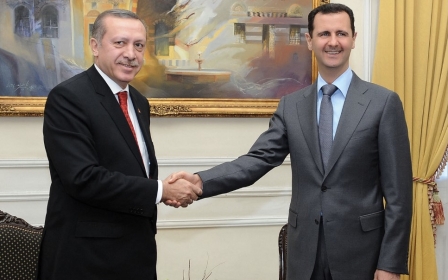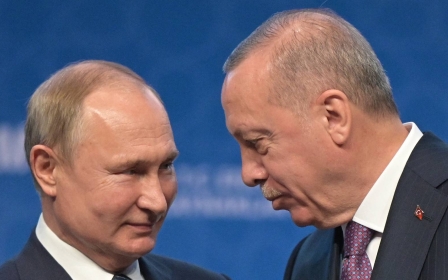Syria war: Turkey's new border offensive is a deliberate test of the West's support

Turkish President Recep Tayyip Erdogan’s announcement of a fresh military campaign against the Kurdish People’s Protection Units (YPG) in northern Syria has reignited debate over the need for safe zones. The new operation seeks to connect two areas already under Turkish control, aiming to clear out security threats and widen the available space for resettling Syrian refugees.
Turkey’s foreign policy discourse on safe zones has remained the same for years: Ankara sees the YPG as a terrorist group that cannot be allowed to gain a foothold along its southern border. Yet, despite Turkey’s three military incursions into northern Syria since 2016, the YPG still controls large swathes of the border area.
In the current context, the Ukraine crisis and the western push to expand Nato seem to be Turkey's strongest leverage
Turkey, which hosts around four million Syrian refugees, has already helped to resettle hundreds of thousands in their home country. Earlier this month, Erdogan announced plans to build 200,000 homes in northern Syria for the voluntary resettlement of one million refugees. Existing communities within Turkish-protected areas suffer from overcrowding and a lack of necessary infrastructure. If more lands are freed from the YPG, Turkey believes, then more people could return to Syria.
The new military operation could also bring domestic advantages, as Turkey grapples with an ongoing economic crisis. Previous operations have garnered widespread support and renewed public trust in government, and with elections looming a fresh military campaign could give Erdogan a needed boost - particularly with anti-refugee sentiment on the rise.
The announcement also comes amid an ideal international backdrop for Turkey, as the Russia-Ukraine war has prompted Sweden and Finland to apply for Nato membership - a move requiring Turkey’s approval. Ankara has criticised the two Nordic countries for having an “open attitude towards terrorist organisations”, referring to the Kurdistan Workers’ Party (PKK), and it was angered by their imposition of an arms embargo against Turkey following its 2019 Syria offensive.
New MEE newsletter: Jerusalem Dispatch
Sign up to get the latest insights and analysis on Israel-Palestine, alongside Turkey Unpacked and other MEE newsletters
Turkey has also accused Sweden and Finland of harbouring people with links to the PKK.
Resistance to Nordic Nato bid
Delegations from Sweden and Finland recently travelled to Turkey in an attempt to change its position, but Erdogan subsequently said he still intended to block their Nato bid. The talks had not been “at the expected level”, he said, noting that Turkey’s security concerns had not been addressed.
In addition, while the discussions were in progress, a former Kurdish Democratic Union Party (PYD) leader with links to YPG and PKK appeared on Swedish state TV, leading Erdogan to question the sincerity of the talks.
The ascension of Sweden and Finland to Nato is widely seen as a crucial step for the western alliance, and Erdogan believes the West would not resist another Turkish operation in Syria at a time when they need his support. In this way, Ankara is testing what it can get from the West in return for approving the Nato bid.
At the same time, Turkey has taken a balanced approach to the Russia-Ukraine conflict, publicly opposing the war while eschewing western efforts to sanction Moscow. Russia could offer Turkey certain assurances in exchange for Ankara blocking Sweden and Finland’s Nato bid, thus strengthening Turkey’s hand vis-a-vis Russia, which has military bases in areas controlled by the YPG.
From a geopolitical perspective, Turkey is thus enjoying optimal conditions for its military operation in Syria - a situation comparable to the 1930s, when Hatay, which had previously been under the French mandate for Syria, joined the Turkish state in 1939 after a referendum. The French agreement with Ankara came in tandem with a Turkish-French treaty guaranteeing Turkish “friendship” during the Second World War.
Today, western powers need Turkey, and their response may thus be muted to a possible Turkish operation in Syria.
Washington's role
Russia has controlled Syrian airspace since 2015, and during the Afrin operation in 2018 Ankara struck an agreement with Moscow to use that airspace for its military campaign. Russian troops also moved from Afrin to Tel Rifaat to facilitate the Turkish operation. Indeed, any operation in northern Syria where Russian soldiers are stationed must be coordinated with Moscow.
Last week, Russian Foreign Minister Sergey Lavrov said that Russian forces in Syria had almost no military missions left, noting that their presence and numbers on the ground were determined by specific tasks. As the Ukraine war grinds on, Russia has reportedly withdrawn some of its forces from Syria in order to redeploy them in Ukraine, which is a priority for Russian President Vladimir Putin.
For its part, Washington, which has provided training and military aid to the YPG under the pretext of battling Islamic State, has criticised Turkey’s plans to launch a new military operation in northern Syria. Ankara’s last safe-zone operation immediately followed the abrupt US withdrawal of troops from the region. Facing criticism over the withdrawal, the Trump administration subsequently brokered a ceasefire.
The difference today is that the Democrats - who in 2019 pressured the Trump administration to impose sanctions on Turkey - hold the presidency, which could make it harder for Ankara to convince Washington to remain silent on a new operation. In the current context, the Ukraine crisis and the western push to expand Nato seem to be Turkey’s strongest leverage.
The views expressed in this article belong to the author and do not necessarily reflect the editorial policy of Middle East Eye.
Middle East Eye delivers independent and unrivalled coverage and analysis of the Middle East, North Africa and beyond. To learn more about republishing this content and the associated fees, please fill out this form. More about MEE can be found here.







